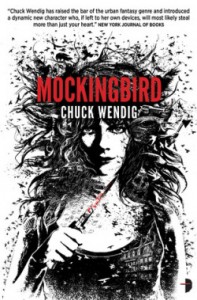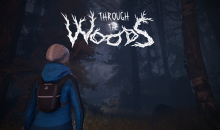Back In Black: Mockingbird, by Chuck Wendig
Some six months ago, Dorkadia reviewed Chuck Wending’s Blackbirds, a nasty, dead-baby-hilarious little thriller about a hitchhiking con artist who knows when you’re going to die. I promised to review the sequel the week after and, uh, well, you do the math. But I finally acquired and read a copy and, behold, The Reviewman Cometh.
Initial reaction: Mockingbird is very good as far as sequels go, drips a little bit of “middle trilogy” syndrome, and leavens its sometimes awkward twists and turns with more of the excellent characterization and colorful prose that made the debut such a joy. From this point on, there are spoilers, so if you haven’t read Blackbirds why don’t you let me convince you? And then come back when you’re done with it, and let me convince you to read the sequel.
For those of you still with me, Mockingbird picks up a while after where we left off, with psychic jerkass Miriam Black making a go at a relatively normal life with her It’s Complicated, the long-suffering trucker Louis. Unsurprisingly, anything approaching “normal” doesn’t work well for the deeply damaged Miriam, and fifty pages into the book she’s found an excuse to go back to being a professional death prophet. It’s a little more respectable than her usual, though, but a side trip undertaking her commission gets her right off the rails and into a mystery.
The real strength of the book as compared to its predecessor is that it’s goddamn creepy, even moreso than the deeply creepifying bits of Blackbirds. Miriam’s apparent foe is practically a smorgasbord of arm-hair-tingling traits, checking into Greek mythology, folk songs, the Black Plague, and slasher films. It gets to the point that the big reveal, while strong, can’t help but feel a little anticlimactic after how ominous the trip there has been. It’s hard to fault that.
There’s also some more exploration of the nature of Miriam’s supernatural power and where it comes from, and sadly, this raises more questions than it answers. It’s well delivered, especially the twist at the climax, but the middle-trilogy problems really manifest themselves here; Miriam has a lot of conversations with something that are full of frustrating obfuscation (in-universe, naturally) and not a lot of answers. Again, hard to get annoyed about a book that doesn’t reveal everything when there’s clearly more books to come, but there are a lot of slow-growing seeds planted.
What else to say? The plot takes Miriam to an all-girls school for troubled youth, as well as a few journeys into her traumatic backstory. We meet a couple teenage girls who could easily grow up to her, her nogoodnik uncle, and a real mess of a crystal meth addict, but the standouts are actually the normal human beings. Most of them are the school staff, a surprisingly reasonable bunch whose interactions with Hurricane Miriam nevertheless bring out the dark and interesting corners of their personalities. Katey Wiznewski, the teacher who engages Miriam’s professional services and kicks off the plot, is easily the best of the lot; she takes the role of foil to Miriam (previously played by sleazebag con artist Ashley in the first book), and their interactions are never not hilarious.
Then there’s also Louis, and sad to say, I’m still not grabbed by him. He has demons of his own, does our goliath trucker, but they’re just not as fun as Miriam’s, and his stoic, determined responses to both their problems seem better in theory than in practice. He’s a little more active in this book, but still one of the least compelling parts; then again, maybe that’s the point. Why does Miriam have so much trouble with this genuinely decent, unfailingly loyal guy? Because he’s fucking boring, dude, and boring is one thing she cannot abide.
And there are lots of others, of course, and they’re all addressed in their turn with creative profanity and reflexive bad attitude. Mockingbird is a master course in how to build a book around your protagonist; Wendig can keep a reader hooked through byzantine plot twists and slow exposition because Miriam Black – oracle, petty thief, sworn enemy of authority, grade-A primo road trash – is just so damn interesting that it’s impossible not to want to see what happens next.
My hope? Another book. And soon. Mockingbird should tide you over, but not for long; it’s a quick read even when it’s slow, and downright gripping when things start happening. Another success, albeit one with as many promises as deliveries. Check it out.







